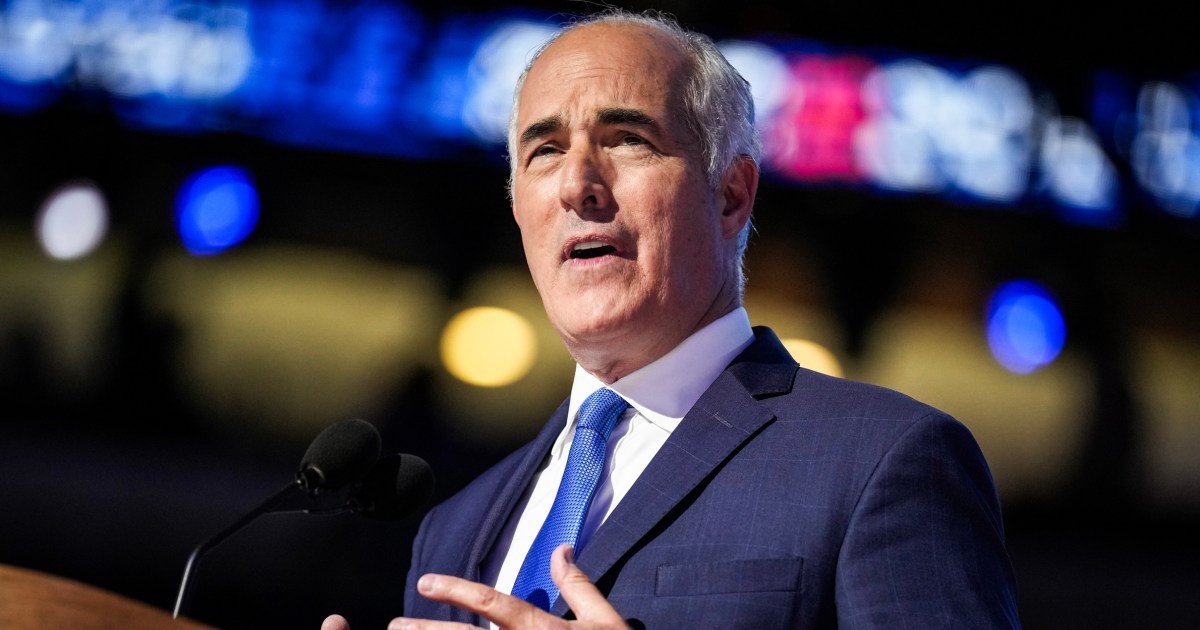In seeking to address voters’ concerns about an issue that has weighed heavily on members of his party across the country, Senator Bob Casey, Democrat of Pennsylvania, believes he has found the winning formula: fighting “predatory inflation.”
In one of the most contentious and expensive Senate races this cycle, Casey focused on this populist economic message — the idea that corporate greed drives high prices — as a way to push back against GOP arguments that government policies he supported had led to higher prices. It was the main reason for high inflation.
Casey, who is serving his third term, has run several ads focusing on his campaign against “predatory inflation” in a battleground state and, in the process, provided a road map for Democrats nationally to talk about inflation.
“I think the average person gets that,” said Mike Mikus, a Democratic strategist in Pennsylvania. “They understand that inflation is a problem, and it’s a complex problem. But they get it [‘greedflation’ is] A piece of it. They feel that these companies, these large corporations, are willing to take advantage of the situation to increase their profits at their expense. And what this does is it shows that Senator Casey understands this, and that he’s attacking these big companies when no one else is.
But Casey’s Republican opponents see the message as disingenuous. They claim that Casey, a centrist liberal, has not previously been at the forefront of the populist economic shift in either party. They point out that a number of economists, including libertarian-leaning ones, have said that the idea that corporate greed is the main contributor to rising costs throughout the economy is hollow.
Dave McCormick, Casey’s Republican Senate rival, responded when asked if Casey’s argument was sincere, adding that government spending and energy policy were among the main forces behind inflation in recent years. “Now, does that mean that there’s no company that’s, you know, raising prices to try to make up for the losses that they had during Covid or something like that? I’m not advocating for any particular company. I’m not saying that this doesn’t happen on an exception basis. What What I am saying is that the root cause of inflation is those policy choices.
He added: “In a dynamic free enterprise economy, the way prices are determined is to achieve a balance between supply and demand.” “And if a company is overpricing something, the way it works in a competitive market is for someone else to sell their product at a competitive price. So no, I don’t think there’s a lot of evidence to support that thesis.”
Shifting the focus of inflation to “big companies”
At a Casey campaign event in late August in Haverford, an attendee felt ill-equipped to debate demonstrators outside who were protesting Casey’s efforts to combat “greed.” So I asked Casey for help.
Casey pointed to data showing that corporate profits are outpacing inflation, cited his reports that highlighted specific examples of unnecessary price hikes or companies cutting back on their products while keeping prices within bounds, and went on to propose that the federal government be given the authority to launch investigations into price gouging.
“The big companies are the ones we target,” he said, adding that these companies are “stealing” people.
“They want to make it seem like we’re going to go after small businesses in grocery stores,” he said. “This is a lie. It is a deliberate lie, even by some people who claim to be knowledgeable and intelligent. We will go after the big companies, they will not like it, and if they are not engaged in price gouging, they will have nothing to worry about.”
Casey’s focus on attacking “predatory inflation” has been intense throughout the election cycle. His campaign ran three TV ads exclusively on the topic and highlighted it in a fourth ad seeking to reinforce his independent bona fides. He has written legislation that would allow the Federal Trade Commission to identify “deflationary inflation” as an unfair or deceptive practice, giving it the power to sue companies for the practice — a bill President Joe Biden has called on the Senate to pass in his state. Union speech this year.
This legislation is in addition to the proposal he spoke about in the town of Haverford in August, as well as reports he wrote about predatory inflation, “deflationary inflation” and “stream inflation” — the concept that streaming services raise costs while shrinking their libraries — which he has called out. Kellogg’s, Kimberly-Clark, Proctor and Gamble, Disney, and Coca-Cola, among others.
Casey’s Senate website devotes an entire page to the topic of “greedy inflation,” something he also discussed at length in his speech to the Democratic National Convention this summer. In his two debates with McCormick, this topic was central to a number of mutual discussions.
The core of Casey’s argument is that corporate profits rose from July 2020 to July 2022 at a rate five times faster than the overall inflation rate. His argument is supported by a report released last year by the Federal Reserve Bank of Kansas City, which found that corporate profits contributed a very large share of overall inflation during the recovery from the Covid pandemic.
“It’s real,” Sen. Raphael Warnock, D-Ga., told NBC News of “predatory inflation” at a recent media rally in Pennsylvania, adding that former President Donald Trump would further exacerbate inflation through tariffs. proposed. “We have seen those who have tried to take advantage of the pandemic and, as a result, raise prices.”
Republicans admit argument ‘has some resonance’
But many economists have expressed a great deal of skepticism about the validity of the “greedy inflation” argument. A San Francisco Fed report this year found that “higher interest rates have not been the primary driver of the recent rise and subsequent decline in inflation during the current recovery.” Other economists have described the concept as an “economic illusion,” an “oversimplification,” and a “convenient political meme.” A left-leaning economic policy columnist for The Washington Post called “predatory inflation” a “conspiracy theory.”
“This is the most disingenuous political argument of the course,” a Republican operative working on Senate races told NBC News.
Still, some Republicans acknowledge it’s a powerful campaign message.
“Republicans and independents don’t see that as the main driver of inflation, but they’re also sympathetic to the idea that CEOs benefit from inflation,” said another Republican activist working on Senate races. “I think it has some resonance.”
Pennsylvania State Sen. Maria Collette, a Democrat, said economists who were opposed to the idea of “predatory inflation” were simply out of touch with reality.
“Despite these findings…people feel it, they feel it when they go to the grocery store, they feel it [with] “The amount of product they receive when they buy it,” she said. The statement “It’s really deceptive to tell people what you’re experiencing” is not true.
She continued: “I understand that the studies that are being done show that inflation is not necessarily caused by ‘greedy inflation,’ but that ‘greedy inflation’ is something that affects people at their kitchen tables.” “It affects them when they sit down to pay their bills. So there definitely needs to be something that is addressed.”
“Grave inflation” has become a major component of Democratic messaging on inflation, which was a major concern throughout the campaign. Republicans blamed Biden’s Covid recovery legislation for leading to high levels of inflation, even though it was troublesome around the world after the pandemic. The national poll conducted by NBC News in October found that the cost of living was among the top issues that voters said they felt so strongly about that they would only vote for or against a candidate based on it.
At the presidential level, Vice President Kamala Harris has pledged to make tackling price gouging a “Day One” priority.
“It’s very important,” a Harris campaign official in Pennsylvania said of the messaging about “greed.” “Voters tell pollsters over and over again that the number one issue they care about is the economy, and Kamala Harris has a plan to make that happen, to cut costs to go after corporate price gougers who take advantage of people, many of whom, frankly, may be friends of Trump.”
Another angle to Casey’s focus on “predatory inflation,” as both Democrats and Republicans acknowledge, is that it reinforces his messaging against McCormick, the former hedge fund executive. Casey attempts to portray McCormick as out of touch with ordinary people and unconcerned with being over-exploited by corporate executives.
“It’s really hard for McCormick to make a case against it as a hedge fund manager,” said a Democratic strategist working on Senate races, adding that the “predatory inflation” campaign “has a little bit of a populist slant that clearly seems to be penetrating more here in the United States over the years.” Anyway.
Inflation has slowed from earlier in the election cycle, enough for the Federal Reserve to cut interest rates by half a percentage point last month. The inflation rate in September was 2.4%, the lowest monthly rate since February 2021.
“It’s been the best 10 years of the last 100 years for the stock market. Last year was great. So if you’re an asset owner, I agree with that. I admit the economy is better,” said McCormick, who took out an ad to confront Casey about the subject. “If you’re living paycheck to paycheck, you’re still in business, and that’s what I think Bob Casey and Kamala Harris don’t understand.
He added: “If inflation, that is, the growth rate of inflation, continues to remain modest, and if wages eventually rise, we may be able to emerge from the crisis.” “But right now, people are under pressure, that’s undeniable.”











